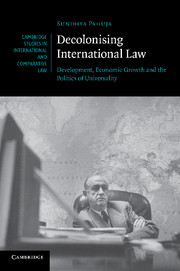Book contents
- Frontmatter
- Contents
- Acknowledgements
- 1 Introduction
- 2 Inaugurating a new rationality
- 3 From decolonisation to developmental nation state
- 4 From permanent sovereignty to investor protection
- 5 Development and the rule of (international) law
- 6 Conclusion
- Appendix One A note on the use of ‘Third World’
- Appendix Two Harry Truman – Inaugural Address
- Bibliography
- Index
- cambridge studies in international and comparative law
1 - Introduction
Published online by Cambridge University Press: 07 October 2011
- Frontmatter
- Contents
- Acknowledgements
- 1 Introduction
- 2 Inaugurating a new rationality
- 3 From decolonisation to developmental nation state
- 4 From permanent sovereignty to investor protection
- 5 Development and the rule of (international) law
- 6 Conclusion
- Appendix One A note on the use of ‘Third World’
- Appendix Two Harry Truman – Inaugural Address
- Bibliography
- Index
- cambridge studies in international and comparative law
Summary
The project
Why has international law, from the perspective of the Third World, been so disappointing? What is it about international law that makes it simultaneously so full of promise, and yet again and again a contributor to the failure of projects articulated in its name? And in the face of these disappointments, why do so many people from both inside and outside the discipline mount what are often devastating critiques of international law – its uses by the powerful, its implication in imperialism, its capacity to facilitate exploitation, its other manifold dark sides – only to conclude with a plea for the reinterpretation of international law, or its retrieval for the powers of goodness? These puzzles were the impetus for this book.
Specifically, I take seriously the idea that many critics from both North and South maintain a strong faith in international law, despite firmly comprehending its complicities with powerful actors, both historical and current. This ‘critical faith’ let us call it, is much more interesting to me than a belief that international law, and human rights in particular, are on the side of the angels and that unhappy outcomes must be understood as ‘distortions’ of that law. It is also more historically grounded as a starting point than a pragmatic quest for ‘policy-relevance’. Though for different reasons, each such approach turns away from international law’s more problematic aspects and refuses to engage with its imperial history and well-documented intimacy with the powerful.
- Type
- Chapter
- Information
- Decolonising International LawDevelopment, Economic Growth and the Politics of Universality, pp. 1 - 9Publisher: Cambridge University PressPrint publication year: 2011

